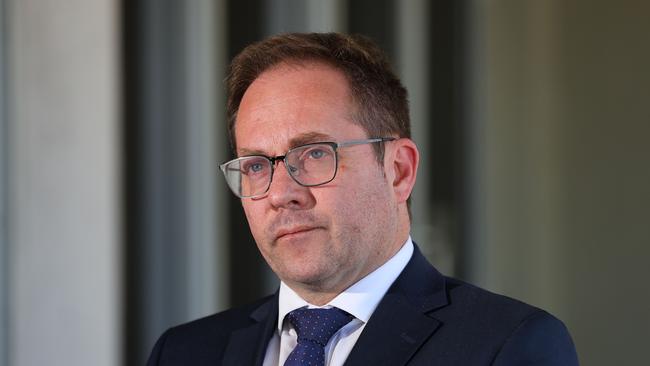Cheap financial advice reforms could stall
Big super says financial advice reforms are now ‘urgent’ but there’s a new minister with a lot on his plate and more delays seem inevitable.

Australians have waited years for affordable financial advice but much-needed reforms could be delayed even further as the new financial services minister pores over his portfolio looking for some easy wins.
Two years after federal Labor released its road map for reforming financial advice and we’re at a standstill, with the meatiest of the changes – the arrival of big super into the advice space – still in question.
The great expectation was that bringing big super into financial advice would make it widely accessible, giving the average person a chance to get a retirement plan in place without having to drop around $5,000.
So far, there’s been limited progress with these reforms that are only becoming more urgent as waves of boomers head closer to retirement.
The first leg focused on the low-hanging fruit, including clarifying the legal basis for funds to charge members for financial advice and streamlining fee consent. These reforms sailed through parliament last year.
But the second leg, the reforms that would allow super funds to employ lesser-qualified advisers to dole out advice while charging all members for the privilege, was put on hold by the election. This despite repeated promises by former financial services minister Stephen Jones that this tranche would be introduced to parliament before May.
We may be further away from getting reforms over the line than we were before the election.
Likely knowing he wouldn’t make his own deadline, Jones split the second tranche in two and put forward proposed legislation for the first part (tranche 2A) in the hope his replacement would follow through with his plan.
But new financial services minister Daniel Mulino won’t be in a rush to push anything through before he gets to grips with a hefty portfolio that includes scams, insurance reforms, service standards in super, as well as the advice reforms.
The new minister, an economist with a PhD from Yale University, takes on the role at a critical moment, with reforms overdue across financial services, including cryptocurrency, super and payment systems, as well as financial advice.
There’s no indication yet what will be at the top of Mulino’s priority list but he is due to meet with key financial industry figures this week to assess the tensions between big super and advisers.
Before the election, tensions were mounting as the advice industry pushed against the government’s proposed legislation for tranche 2A, which suggested super funds could collectively charge for comprehensive retirement advice. Advisers only want funds to be able to provide more basic advice and have people come to them for the more costly, comprehensive offerings.
Both sides must now delicately balance between pushing for what they want without getting Mulino to a point where he puts reforms in the ‘too-hard basket’, delaying progress even further.
The Financial Advice Association of Australia is holding firm on its arguments against the current proposed legislation.
“We believe there’s material room for improvement in that (proposed legislation). These are important issues and getting it right will have significant consequences,” FAAA policy and advocacy general manager Phil Anderson said.
“We’re trying to get a solution that is in the best interests of Australian consumers of financial advice for the long term. We don’t want to do something and then find it needs to be tinkered with in a few years time and then again in another five years time. It’s important to get it right.”
The FAAA supports collective charging for financial advice but only if it’s simple advice.
“One of the challenges here is, how do you define simple advice. As well as that, it’s really important, from a consumer protection perspective, that they are getting quality advice,” Anderson says.
The super industry, for its part, is already gearing up for the changes.
Colonial First State Super chief executive Kelly Power says Australians are crying out for accessible advice, with the need even greater than before due to current cost-of-living pressures.

“Creating an environment that allows advisers to service more clients is now a matter of urgency. People really need these advice reforms, so it’s important the government progresses with these changes,” Power says.
“From our perspective, it’s also important the government considers the reforms holistically. Not just in individual pieces, but actually looks holistically about how to solve this gap, this pain point of people not being able to get the help they need.”
As part of the reforms, the government is proposing to create a new class of adviser that would be restricted to providing advice on products issued only by super funds. But the industry is still waiting for more detail.
A new class of adviser employed by the funds themselves also raises questions as to the potential conflict that arises from an in-house adviser giving retirement recommendations.
Separately, CPA Australia has cautioned the government against extending the simpler, funds-based advice to cover retirement income products.
“Assessing and advising on retirement income requires highly specialised knowledge and a detailed understanding of each member’s unique financial situation both inside and outside
of superannuation,” the accounting industry group says in its submission on the reforms.
“Extending intrafund advice to include these products could lead to inadequate or inappropriate advice, potentially jeopardising members’ financial security in retirement. Therefore, it is essential to maintain a clear distinction between general superannuation advice and the more complex, personalised advice needed for retirement income planning.”




To join the conversation, please log in. Don't have an account? Register
Join the conversation, you are commenting as Logout